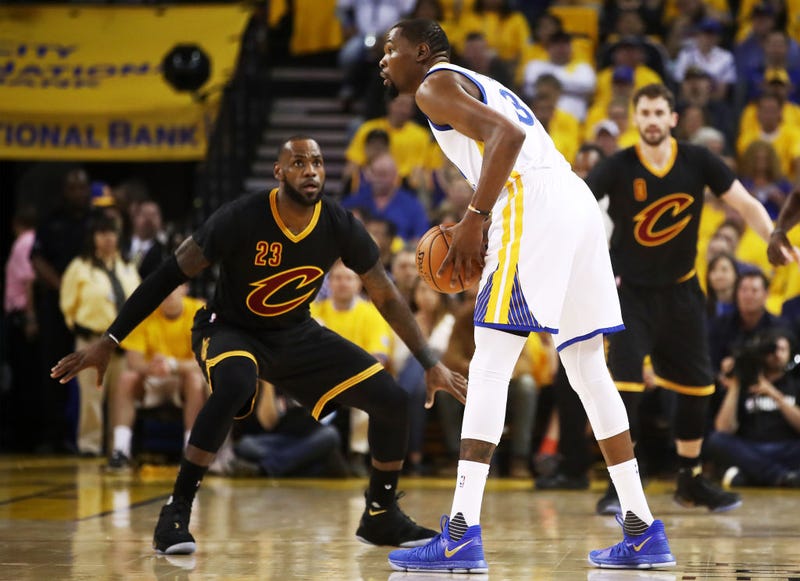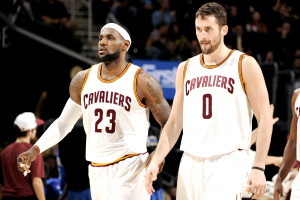
For a few fleeting moments, the fourth Finals meeting between the Golden State Warriors and the Cleveland Cavaliers seemed in peril. Both teams went down 3-2 in their respective Conference Finals and neither had home court advantage when each series went to a decisive Game 7. But, as has been said for the past three calendar years in the modern NBA, none of those things mattered.
We are getting a fourth installment of the Cavs and Warriors in the Finals, whether we want it or not. Frankly, most everyone knows how this will end. The Warriors are a lot better than Cleveland and just eliminated a 65-win team despite only playing to their potential for one quarter per game, at most.
Nonetheless, let’s do a little Finals preview, shall we?
Iso What?
When Kevin Durant left the Thunder to sign with the Warriors in 2016, he left one of the most stagnant and isolation-dependent offenses in the league to join one of the most free-flowing offenses in the history of the sport. It worked out that way last season, but it hasn’t been the same this year.
In last year’s playoffs, Golden State ran just 6.8% of their possessions in isolation; this would typically come in the form of a favorable one-on-one matchup with either Durant or Steph Curry. This would happen towards the end of the game if Golden State really needed a bucket or at any other time they did. Over their first three Finals runs, ball movement and player movement were the staples of one of the best offenses in NBA history, and that didn’t initially change when Durant entered the fold.
Now, however, it has.
In these playoffs, the percentage of possessions that Golden State uses in isolation action has risen to 11.2%, up nearly 65% from last season. That’s perfectly fine when you have Durant and Curry, but at some point, your offense stagnates and other players aren’t involved in the action. Of course, this is an uptown problem for one of the most talented rosters in NBA history; the Cavaliers have had higher isolation percentages the past two playoffs and they aren’t nearly as skilled as Golden State. But the Warriors destroyed Cleveland in the Finals last season averaging 29 assists and 121 points per game in just over 100 possessions per game. Against the Rockets, Golden State averaged 21 assists per game and just over 107 points per contest on an average of slightly under 94 possessions. When Cleveland beat Golden State in 2016, each game of the Finals averaged 92 possessions.
The only way the Cavaliers win this series is if they don’t get snookered into playing the Warriors’ style of basketball. The problem is that the Warriors are struggling to play like that themselves.
Worst Supporting Actor(s)
The Cleveland Cavaliers have always been a one-man show. This year, however, the gap in talent between LeBron James and his teammates is more frightening and stark.
In these playoffs, James is averaging 34 points per game and shooting just over 54% from the field. The rest of the Cavaliers are not faring as well; the supporting cast is averaging just 67 points per game and they have been bailed out in these playoffs by seven 40-point games from James. The problem for Cleveland, then, is this: how much more can LeBron do and how difficult will it really be for the Warriors to shut down the Cavs’ offense?
The fact of the matter is that the Cavaliers role players need to be better. While Jeff Green chipped in 19 and J.R. Smith had 12 in Game 7 against Boston, these performances were more of an anomaly than the rule in these playoffs. Kevin Love missed Game 7 with a concussion suffered in the previous game, and even though he provides perimeter shooting and quality rebounding, he will have a very difficult time trailing the likes of even Draymond Green on the perimeter. If the Warriors look to get Cleveland into switching action, he would likely have to defend either Curry, Durant, or Klay Thompson. If that happens (and it will, if/when Love returns), advantage: Warriors, particularly if Andre Iguodala is in the starting lineup (more on him later).
Honestly, the Cavaliers’ supporting cast has never been talented enough to win a championship, whether that was before or after the team nuked its own roster at the trade deadline. Sure, GM Koby Altman did the best he could at that point because the Cavaliers, at the time, were a directionless car moving aimlessly towards the chaotic intersection that is the NBA Playoffs. But even though Cleveland got younger and faster in February, that does not mean they necessarily got better.
LeBron James will have to carry the load once more for the Cavaliers if they want to advance to the NBA Finals. It may be too much for him to handle, not because he isn’t capable, but because the Warriors are too good and his supporting cast is too bad.
Andre Iguodala
This one pretty much explains itself. Iguodala missed Golden State’s last four games of the Western Conference Finals with a knee injury. In the three games with him in the lineup against Houston, the Warriors averaged 116.7 points per contest. Without him, they averaged 100.5. The difference with and without him on the floor is drastic, as Iggy has a +11.1 rating per 100 possessions when he is on the floor in these playoffs.
It seems strange to say this about a team that has four of the 15 or 20 best players in the game right now, but Andre Iguodala is the adhesive that keeps the Warriors clicking on both ends. Golden State head coach Steve Kerr said today that the Warriors would have beaten the Rockets in five games with the former Finals MVP healthy, and I have to say that I can’t disagree with him. Golden State likely wins the knock-down, drag-out, 90s-esque battles in Games 4 and 5 with him on the floor, and the fact that the Warriors were able to overcome a 3-2 deficit against a 65-win team without him is a testament to just how much talent is on their roster.
The talent disparity between them and the Cavaliers would become even greater if he finds a way to play in these Finals.
I will admit that I’ve done more comprehensive previews for these series in the past, and apologies if comprehensive is what you were looking for here. The fact of the matter is, though, that the Warriors are at least ten times more talented than the Cavs and, even though it’s a far worse fate than he deserves, LeBron James will get bounced in short order by a team he can’t single-handedly take down for the second straight year.
I’ll give the Cavaliers one win out of respect for the greatest player of all time being on their roster. But I can’t fathom a way in which they win this series, unless the Warriors fall back on the same bad habits that nearly got them knocked out of the Playoffs by a shorthanded Rockets team.
Pick: Warriors in 5





 the chance to improve on last year’s showing and build a title contender. This year is no different, as there are plenty of key free agents that could be changing teams. This list will be the five most important free agents this year, not necessarily the best ones. So let’s get started, with the five most important NBA free agents this summer.
the chance to improve on last year’s showing and build a title contender. This year is no different, as there are plenty of key free agents that could be changing teams. This list will be the five most important free agents this year, not necessarily the best ones. So let’s get started, with the five most important NBA free agents this summer.